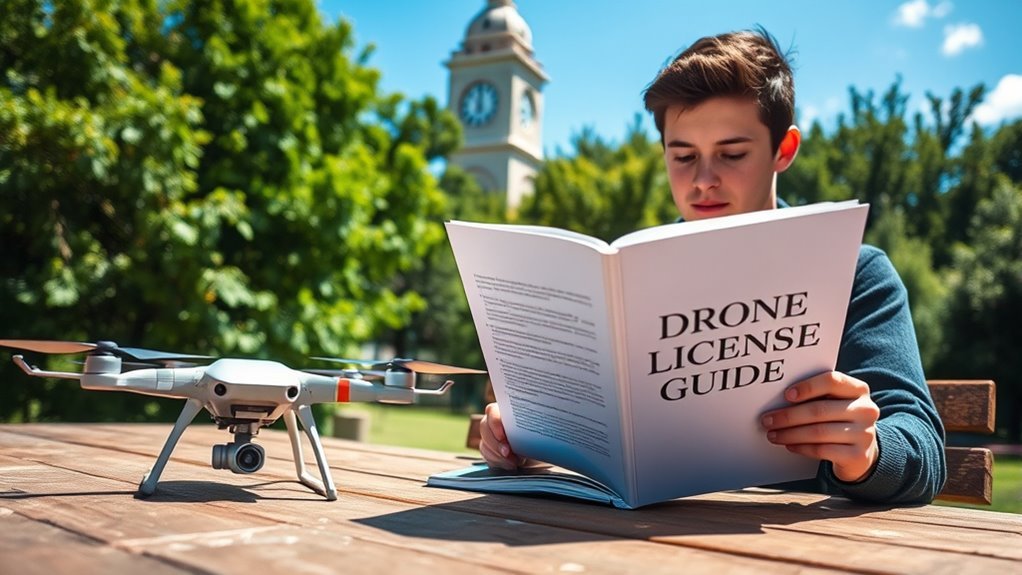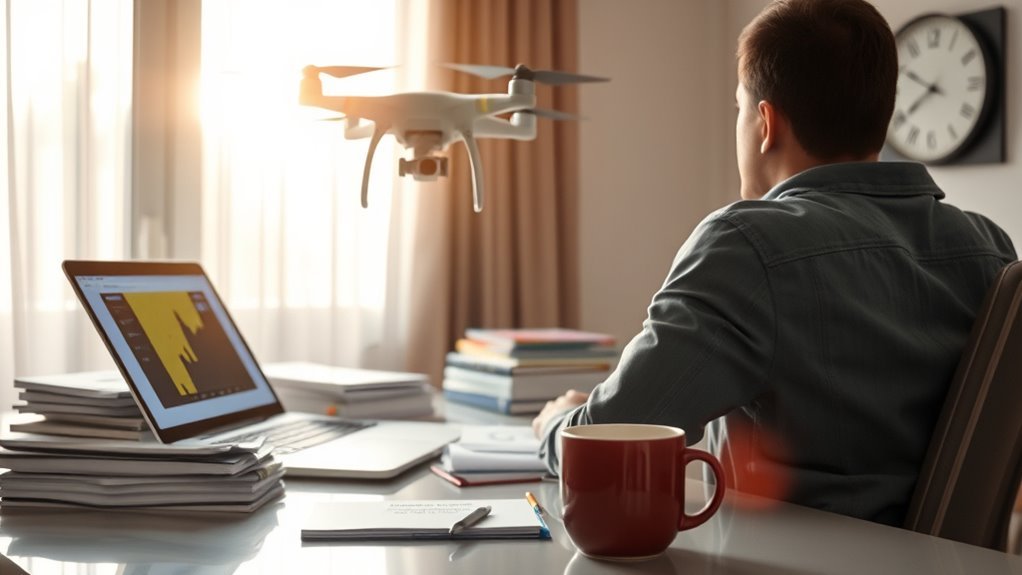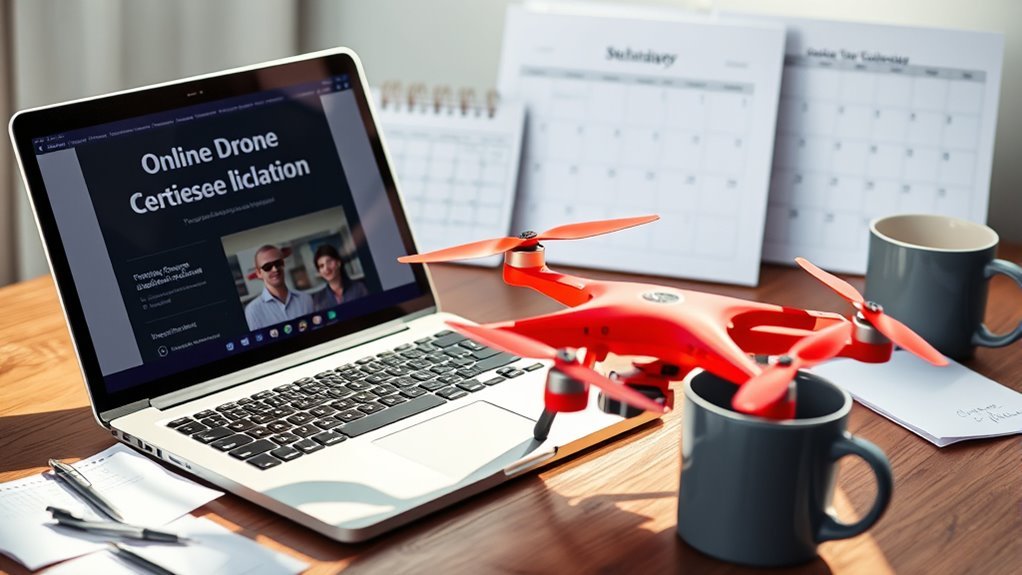Getting a drone license typically takes about 20 to 30 days after you submit your application. However, processing times can vary based on factors like the volume of applications and any regulatory changes. To speed up the process, it’s essential to prepare your documents and study materials in advance. By understanding the entire process, you’ll be better positioned for success—and you’ll discover more tips to streamline your licensing journey ahead.
Understanding Drone License Types

When you’re considering flying a drone commercially or for recreational purposes, it’s essential to understand the different types of drone licenses available. For commercial pilots, the FAA Part 107 license is a must, which includes specific license requirements like passing an aeronautical knowledge test. This certification allows you to operate commercially, granting you the freedom to explore various aerial opportunities. For recreational users, no formal license is needed, but you must follow guidelines set by certification bodies like the FAA to guarantee safety and compliance. Understanding these distinctions empowers you to make informed decisions about your drone flying journey, helping you navigate the skies without unnecessary restrictions.
The Importance of Drone Licensing

Getting a drone license isn’t just a formality; it’s an essential step for legal compliance. By obtaining your license, you’re not only following the law but also ensuring the safety of others around you. This responsibility can greatly impact the way drones are perceived in your community. Additionally, understanding local drone regulations is crucial to operate within the legal framework and maintain community trust.
Legal Compliance Necessity
Although flying a drone can be an exciting and rewarding experience, understanding the legal compliance necessity surrounding drone licensing is crucial for any operator. Failing to adhere to compliance requirements can lead to serious legal implications, including fines and restrictions on your flying privileges.
| Compliance Aspect | Importance |
|---|---|
| Registration | Legally required for most drones |
| Insurance | Protects you from liability |
| Airspace Awareness | Guarantees safe navigation |
| Local Regulations | Prevents legal issues |
Safety and Responsibility
While you might be enthusiastic to take to the skies with your drone, understanding the significance of licensing is crucial for guaranteeing both safety and responsibility. A drone license isn’t just a piece of paper; it signifies your commitment to drone safety and responsible flying. By obtaining a license, you gain essential knowledge about airspace regulations, weather conditions, and potential hazards, which can prevent accidents and guarantee smooth operations. Additionally, being licensed boosts your credibility as a pilot, making it easier to collaborate with others or even monetize your skill. Ultimately, embracing this responsibility helps protect not only your freedom to fly but also the safety of those around you. So, invest the time and effort—it’s worth it for everyone involved.
Overview of the Licensing Process

To get your drone license, you’ll need to understand the required certifications and training. Knowing the application submission timeline is essential for planning your journey. Plus, you’ll want to prepare effectively for the exam to guarantee success.
Required Certifications and Training
Steering through the process of obtaining a drone license requires a clear understanding of the necessary certifications and training. First, you’ll need to meet the certification requirements set by aviation authorities, which typically include passing a knowledge test covering airspace rules, weather, and drone operation. Enrolling in training programs can be invaluable, helping you grasp these concepts and gain practical flying experience. Many offer hands-on instruction and online courses tailored to your learning style. Additionally, some programs provide resources for the knowledge test, increasing your chances of success. By investing time in these certifications and training opportunities, you’re not just preparing for the exam but also setting yourself up for a safe and enjoyable flying experience.
Application Submission Timeline
Understanding the application submission timeline is essential for anyone looking to obtain a drone license. Once you’ve met the required certifications and training, you’ll submit your application online. Generally, the FAA processes applications within 20 to 30 days, but processing delays can occur due to high volumes or missing documents. It’s imperative to check your application status regularly through the FAA’s portal to stay updated. If your application is delayed, you may need to provide additional information or clarify any discrepancies. Staying proactive can help you navigate these potential hurdles and keep your path to freedom in the skies on track. With patience and diligence, you’ll be ready to fly before you know it!
Exam Preparation Steps
When preparing for the drone licensing exam, it’s essential to have a structured approach to guarantee you cover all necessary topics. Start by gathering quality study materials that align with the FAA’s requirements. These resources will help you understand airspace regulations, weather, and drone operations. After you’ve gone through the materials, it’s time to assess your knowledge with practice tests. These tests not only familiarize you with the exam format but also highlight areas where you might need more review. Set aside dedicated study time each week, and make sure you’re comfortable with the content. This focused preparation will boost your confidence and assure you’re ready to fly freely and safely once you earn your license.
Step-by-Step Guide to Obtaining a Drone License
Have you ever wondered what it takes to get a drone license? The process is straightforward, and by following these steps, you’ll be soaring in no time. First, familiarize yourself with drone regulations to guarantee compliance. Next, complete your license application, which includes providing identification and proof of training.
Here’s a brief overview:
| Step | Description | Time Estimate |
|---|---|---|
| Research Regulations | Understand local laws | 1-2 days |
| Training Course | Complete a certified course | 2-4 weeks |
| Practice Flight | Log flight hours | Ongoing |
| License Application | Submit necessary documents | 1 week |
| Exam Prep | Prepare for the knowledge test | 1-2 weeks |
With determination, you’ll be ready to take flight!
Timeframes for Different License Types
While the process of obtaining a drone license can vary considerably depending on the type of license you’re pursuing, it’s important to know what to expect. For a Remote Pilot Certificate, you’re typically looking at a few weeks to complete the necessary training and pass the FAA exam. If you’re aiming for a more advanced license, like a Part 107 Waiver, you might need several months to meet the additional drone regulations and licensing requirements. It’s essential to factor in the time for study materials and practical flight experience. Understanding these timeframes can help you plan your journey into the skies, ensuring you’re well-prepared to enjoy the freedom that flying a drone offers.
Factors Affecting the Licensing Duration
Several key factors can influence how long it takes to obtain your drone license. First, the efficiency of licensing agencies plays a significant role; some are quicker than others in processing applications and scheduling exams. If you’re in a region with a high volume of applicants, you might face delays. Additionally, regulatory changes can impact the timeline. As rules evolve, you may need to adapt to new requirements or take additional training, lengthening the process. Your preparation also matters—if you’re well-versed in the necessary knowledge, you’ll likely breeze through tests and paperwork. All these elements combine to shape your journey towards that coveted license, so staying informed and ready can help you navigate the process more smoothly. Understanding the drone registration requirements is essential for timely licensing as it affects the overall application process.
Tips for Speeding Up the Licensing Process
To expedite the drone licensing process, consider implementing a few strategic approaches. By focusing on a streamlined application and efficient study methods, you can save time and energy. Here are four tips to help you along the way:
- Research Requirements: Know exactly what’s needed for your application to avoid delays.
- Prepare Documents: Gather necessary paperwork in advance for a smoother submission.
- Use Study Aids: Leverage online courses or apps that provide structured learning and practice tests.
- Network with Other Pilots: Connect with experienced drone operators who can offer insights and tips on the process.
Preparing for the Practical and Written Exams
As you prepare for the practical and written exams, it’s crucial to understand what each entails and how to effectively study for them. For the written exam, focus on exam study materials that cover regulations, airspace, and safety protocols. Use study guides and online courses to reinforce your knowledge.
For the practical exam, familiarize yourself with your drone’s controls and practice techniques. Conduct mock flights to build confidence and make sure you’re comfortable with maneuvers.
Joining a local drone club can also provide valuable insights and hands-on training. Remember, the more you practice, the more prepared you’ll feel. Set a study schedule, consistently review your materials, and don’t hesitate to ask for help. Your freedom to fly starts with being well-prepared!
Frequently Asked Questions
Can I Fly a Drone Without a License?
You can fly a drone without a license for recreational flying, but you must follow drone regulations. Always check local laws to make certain you’re compliant, as rules can vary by location and situation. Enjoy your freedom responsibly!
Are There Age Restrictions for Obtaining a Drone License?
When it comes to age restrictions for a drone license, you’ll need to be at least 16. However, age exemptions might apply for certain situations, so it’s worth checking if you’re eligible.
What Is the Cost Associated With Getting a Drone License?
Getting a drone license involves a cost breakdown of training expenses, including course fees, study materials, and potential flight time. You’ll want to budget accordingly to guarantee you maximize your freedom in the skies.
Do I Need Insurance to Operate a Licensed Drone?
You don’t necessarily need insurance to operate a licensed drone, but having drone insurance with liability coverage is highly recommended. It protects you from potential damages, ensuring your freedom to fly without financial stress.
Can I Obtain a Drone License Online?
Yes, you can obtain a drone license online! Many places offer an online application process and virtual training courses, making it easier and more convenient for you to gain the knowledge and skills you need.

